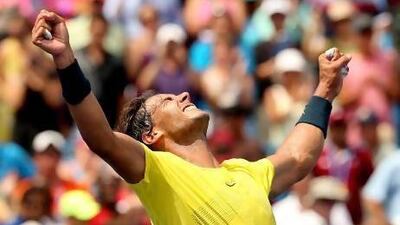We thought Rafael Nadal's comeback would be one long, baleful hobble. How wrong we were with our gloomy prophesies as the Spaniard took that seven-month break, wondering if he would ever come back, let alone reach those celestial heights again.
We were not alone. Nadal himself had his doubts.
"I am a positive guy, but doubts are part of life," he said earlier this year. "So I for sure have doubts, but I work as much as I can to be here."
Even Boris Becker had similar thoughts. "Before his comeback, I was worried if he would come back at all," the German tennis legend said a few months back.
"An injury is going to affect you mentally and physically. You lack confidence and any sort of match fitness. That's on the mental side. But on the physical side, you just don't know whether your knees are strong enough when you are being pushed."
But Nadal revels in those situations. He was 12 when he won a Spanish Under 14 title with a broken finger, feeling the pain only when his victory celebrations had died down.
He was 19 when doctors told him he would never be able to play tennis again. A congenital disease had deformed his tarsal scaphoid (the bridge of his foot) and the doctors said his tennis career was over. Golf was mooted as a possible alternative by father Sebastian.
But Nadal is not a quitter; he is the ultimate fighter on the tennis court, and off it as well.
Forced to sit out for four months, he hobbled to a nearby tennis court and, throwing his crutches away, starting hitting forehands while sitting on a plastic chair.
Then he sought a second opinion and doctors told him a return was possible if he wore shoes with special orthotics to divert the pressure away from his foot.
But there was a warning: his knees, hips and back would eventually buckle under the additional shock-absorbing stress.
Nadal took that chance.
"The doctor said he could not understand how he could still play," his uncle and coach Toni Nadal said at the 2012 Australian Open. "In 2005, we thought we might be here for two more years. Now it is 2012 and we are still here."
It is 2013 and Nadal is enjoying statistically his best year on the tour. At 27, he is 53-3 since his return in February and has won eight of 11 tournaments, including hard-court titles in successive weeks for the first time in his career.
Andre Agassi once said Nadal was "writing cheques that his body can't cash".
But like he has done with his opponents, "El Fenomeno" has forced his body into submission as well.
Follow us

